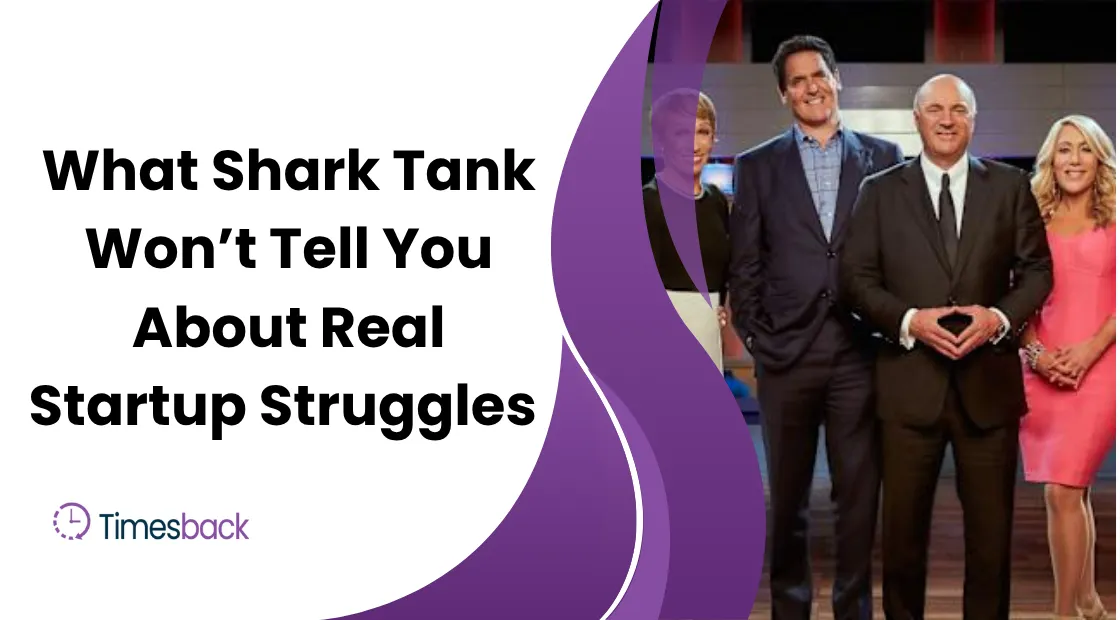What Shark Tank Won’t Tell You About Real Startup Struggles

Real startup struggles are rarely glamorous, despite the polished pitches and dramatic negotiations showcased on Shark Tank.
Anúncios
The reality of launching a business is a gritty, unpredictable journey filled with sleepless nights, financial tightropes, and emotional rollercoasters that no TV edit can fully capture.
While the show highlights charismatic entrepreneurs and their big wins, it glosses over the less cinematic challenges that define the entrepreneurial grind.
This article dives deep into the unspoken hurdles founders face, offering a candid look at the obstacles that don’t make it to prime time.
Anúncios
Why do so many startups fail despite brilliant ideas?
Let’s unpack the raw, unfiltered truth about building a business from the ground up.
Understanding these struggles is crucial for aspiring entrepreneurs who may be lured by the glamor of reality TV but need to prepare for the hard work ahead.
The Myth of Overnight Success
Shark Tank thrives on the narrative of a scrappy founder landing a life-changing deal, but real startup struggles don’t resolve in a 10-minute pitch.
The show’s format creates an illusion of quick wins, where a compelling story and a flashy prototype secure funding.
In reality, success is a marathon, not a sprint.
According to a 2023 study by CB Insights, 70% of startups fail within their first five years, often due to issues like poor market fit or running out of cash.
The TV spotlight skips the months—or years—of iteration, rejection, and pivot that precede a single investor meeting.
Consider Jane, a hypothetical founder of a sustainable packaging startup.
She spent 18 months refining her product, only to discover her target market preferred cheaper, non-eco-friendly alternatives.
Her Shark Tank moment never came because she was too busy navigating supply chain disruptions and convincing skeptical suppliers to take a chance on her unproven brand.
This is the grind the cameras miss: the slow, unglamorous work of proving a concept in a crowded, unforgiving market.
Moreover, the pressure to present a polished pitch often leads to founders downplaying the extensive groundwork necessary for success.
Cash Flow: The Silent Killer
One of the most brutal real startup struggles is managing cash flow, a topic Shark Tank rarely explores beyond a quick question about burn rates.
Entrepreneurs often underestimate how quickly money disappears when scaling.
Rent, payroll, marketing, and unexpected legal fees can drain accounts faster than a pitch can be memorized.
The show might show a founder celebrating a $500,000 deal, but it won’t reveal the months of delayed vendor payments or maxed-out credit cards that follow.
| Cash Flow Challenges | Impact on Startups |
|---|---|
| Delayed Customer Payments | Disrupts operational budgets, forcing reliance on loans or personal funds. |
| High Fixed Costs | Limits flexibility, especially for early-stage ventures with unpredictable revenue. |
| Unexpected Expenses | Legal disputes or equipment failures can derail growth plans. |
Take Mike, who launched a tech-driven fitness app.
His pitch deck projected hockey-stick growth, but he didn’t anticipate a $20,000 server crash or the cost of complying with new data privacy laws.
Six months after a small angel investment, he was still rationing funds to keep his team paid.
Cash flow isn’t sexy, but it’s the lifeblood of any startup, and mismanaging it is a one-way ticket to failure.
To mitigate these risks, founders must develop robust financial forecasts and maintain close communication with their financial advisors.
+ 7 Pricing Psychology Hacks to Use in Your Small Business
The Emotional Toll of Rejection
Entrepreneurship is a gauntlet of rejection, another facet of real startup struggles that Shark Tank sanitizes.
The show’s sharks may pass on a deal with a witty remark, but in the real world, rejection stings harder and comes from every direction—investors, customers, even employees.
Founders must develop a thick skin while maintaining the confidence to keep pitching.
The emotional weight of constant “no’s” can erode even the most resilient spirits.
Imagine pitching to 50 investors, each one poking holes in your vision.
That was Jane’s reality.
After her packaging idea flopped, she pivoted to a new product, only to face skepticism about her lack of industry experience.
Each rejection chipped away at her confidence, yet she had to rally her small team and keep pushing.
This emotional endurance test is a silent struggle, rarely discussed but universally felt among founders.
Furthermore, building a support network of fellow entrepreneurs can provide invaluable encouragement during these challenging times.

Market Fit: The Elusive Holy Grail
Finding product-market fit is like chasing a mirage, and it’s one of the real startup struggles that Shark Tank oversimplifies.
The show often frames market fit as a given—entrepreneurs present polished products ready for mass adoption.
In truth, identifying what customers actually want is a messy, iterative process.
Founders must navigate conflicting feedback, shifting trends, and competitors who move faster.
| Steps to Achieve Market Fit | Common Pitfalls |
|---|---|
| Customer Discovery | Misinterpreting feedback or targeting the wrong audience. |
| Prototype Testing | Rushing to scale before validating demand. |
| Iteration Based on Data | Ignoring data in favor of gut instinct or early success. |
For Mike, market fit was a moving target.
His fitness app initially attracted gym-goers, but user data revealed that remote workers were his true audience.
Pivoting meant rewriting code and rebranding, costing months and thousands of dollars.
Shark Tank might show a founder nailing their niche in a single pitch, but real-world market fit demands relentless experimentation and adaptation.
To enhance their chances of achieving market fit, founders can utilize tools like surveys and focus groups to gather real-time customer feedback.
The Team Dynamic Dilemma
Building a team is another layer of real startup struggles that doesn’t get airtime.
Shark Tank focuses on the solo founder’s charisma, but startups live or die by their teams.
Hiring the right people, fostering collaboration, and managing conflicts under pressure are monumental tasks.
A single toxic hire or misaligned co-founder can derail progress faster than a bad pitch.
Jane learned this the hard way when her first hire, a brilliant but abrasive engineer, clashed with her marketing lead.
The resulting tension slowed product development and created a rift in her tiny team.
Resolving it required uncomfortable conversations and, eventually, a tough firing decision.
Shark Tank doesn’t show the late-night debates over equity splits or the heartbreak of letting go of a friend who’s underperforming.
Additionally, investing time in team-building activities can help strengthen relationships and improve communication among team members.
The Funding Mirage
Securing funding is the Shark Tank centerpiece, but real startup struggles around financing are far more complex.
The show makes it seem like a single deal solves everything, but in reality, funding is a constant hustle.
Founders must navigate dilutive equity deals, demanding investors, and the pressure to deliver quick returns.
Even after a deal, terms like liquidation preferences or board control can haunt founders for years.
Mike’s angel investor demanded a 30% equity stake and a board seat, which sounded great until the investor started pushing for aggressive expansion over product quality.
The pressure to meet milestones strained his team and diluted his vision.
Funding isn’t a finish line; it’s a new set of real startup struggles wrapped in legal jargon and high expectations.
For more insights on navigating startup funding, consider visiting Investopedia.

Scaling Without Breaking
Scaling a startup is like trying to build a plane while flying it—a chaotic, high-stakes balancing act.
Shark Tank loves to highlight the moment a business lands a big retailer or goes viral, but scaling introduces real startup struggles that can break even the most promising ventures.
Supply chain bottlenecks, quality control issues, and customer service demands can overwhelm unprepared founders.
Jane’s packaging company finally landed a major client, but fulfilling the order meant tripling production overnight.
Her supplier couldn’t keep up, leading to delayed shipments and frustrated customers.
Scaling isn’t just about growth; it’s about anticipating chaos and building systems to survive it.
The show’s montage of success skips the spreadsheets, late-night logistics calls, and customer complaints that define this phase.
To effectively manage scaling, founders should develop contingency plans and invest in scalable technology solutions ahead of time.
++ What Entrepreneurs Can Learn from Street Vendors
The Founder’s Mental Marathon
Perhaps the most overlooked of real startup struggles is the toll on mental health.
Shark Tank portrays founders as unstoppable optimists, but the reality is a relentless grind that tests resilience.
Founders juggle self-doubt, burnout, and the pressure to project confidence to stakeholders.
A 2024 survey by Startup Snapshot found that 72% of founders reported experiencing burnout or anxiety, with many citing isolation as a key factor.
Mike found himself awake at 3 a.m., second-guessing his app’s viability while fielding investor emails.
He couldn’t share his fears with his team, who relied on his leadership, or his family, who didn’t understand the startup world.
This mental marathon is the unspoken cost of entrepreneurship, one that no shark’s check can fix.
Seeking professional support or counseling can be a game-changer for maintaining mental health during the entrepreneurial journey.
Why the Struggle Matters
So, why endure these real startup struggles?
Because the chaos, rejection, and uncertainty forge something extraordinary: resilience, ingenuity, and a shot at creating something meaningful.
Shark Tank sells the dream, but the real magic happens in the trenches, where founders learn to adapt, pivot, and persevere.
The struggles aren’t just obstacles; they’re the crucible that shapes innovation.
For every polished pitch on TV, there are thousands of Janes and Mikes fighting through cash crunches, market missteps, and sleepless nights.
Their stories may not make prime time, but they’re the heartbeat of entrepreneurship.
So, next time you watch a Shark Tank deal close, ask yourself: what’s the real story behind that smile?
The answer lies in the struggles that define the journey—struggles that are messy, human, and profoundly worth it.
Recognizing and embracing these challenges can ultimately lead to greater fulfillment and success in the entrepreneurial landscape.
